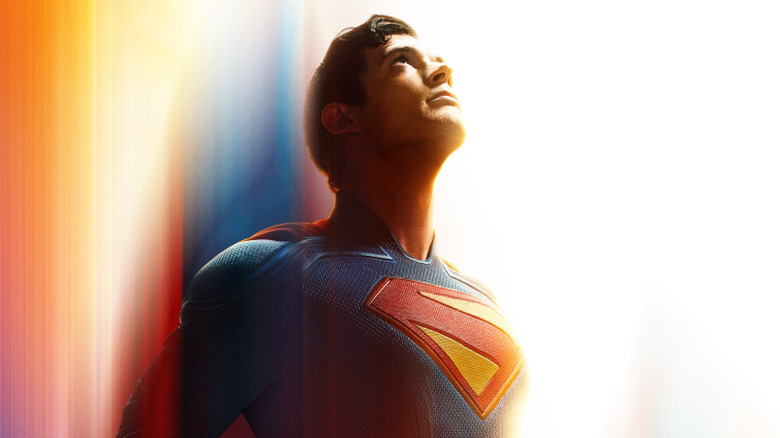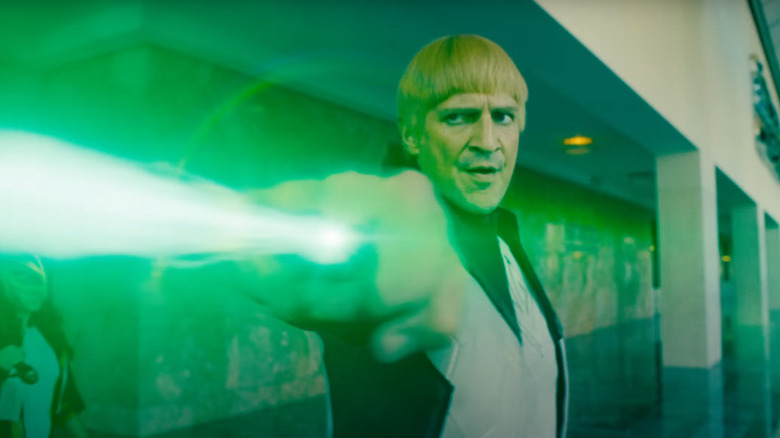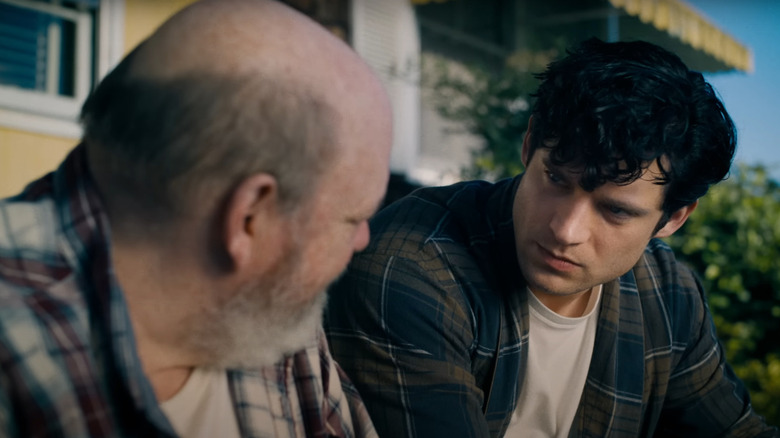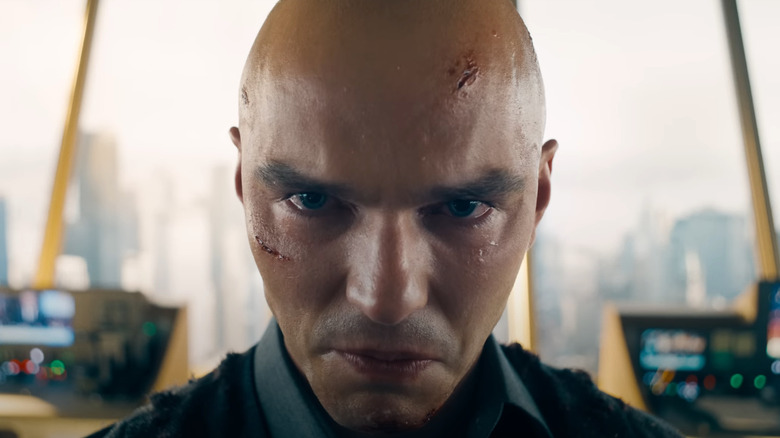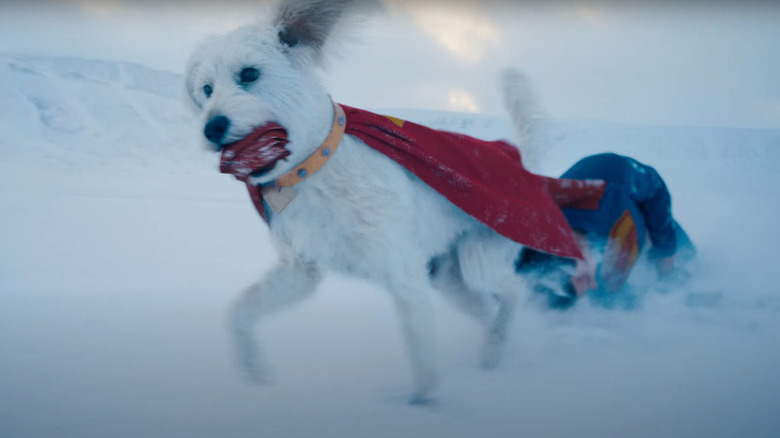James Gunn & Peter Safran's DC Studios Vision Is The Ambitious Antidote To Superhero Fatigue
It's an idiom that all of us have been hearing some form of since we were little kids: you can have too much of a good thing. Whether it's candy, television, praise, or money, something which is otherwise lovely can become oversaturated and lose a good amount of its appeal. This appears to be the case with superhero movies. At the turn of the century, the future appeared bright and long for cinema that finally brought comic book superhero characters to the screen after decades of them existing in just two dimensions. Sure, characters like "Superman" and "Batman" had their own big-screen coming out parties in the '70s and '80s, respectively, but those characters have been popular since the Second World War. The production — and, most importantly, box office success — of films like "X-Men," "Iron Man," and especially "The Avengers" heralded an age when less-generally-known characters could have their own films that strove to emulate the comics they sprang from.
To put it bluntly, the Marvel Cinematic Universe took material once looked down upon as the exclusive purview of freaks and geeks and turned them into global mainstream pop culture. Suddenly, it wasn't just your nerdy friends online talking knowledgeably about Thanos, but your grandmother, too. Of course, to have this happen at all was an indication that the MCU had saturated the marketplace, and that saturation has only continued past what many feel was the franchise's natural endpoint, 2019's "Avengers: Endgame." Since then, the MCU has trudged on, with heavily varying results. Meanwhile, others studio with access to comic book characters have been flailing about attempting to get their own cinematic universes off the ground. Sadly, DC Comics, who technically kicked off the "movies that take superheroes seriously" boom, became a victim of putting the cart before the horse one too many times, ending up with a confused and confusing DC Extended Universe that didn't satisfy enough hardcore fans and failed to bring in much of a new crowd.
Now, James Gunn and Peter Safran's new and (hopefully) improved DC Studios has taken the reins of the company's huge collection of beloved characters, and although they're only two years into this new pivot for the brand, they seem to have a good collective head on their shoulders when it comes to putting story first and grandiose cultural milestones second. A trip that I took last week to the Warner Bros. lot to have a "town hall"-style chat with Gunn and Safran only confirmed this. In a landscape where Marvel movies are now expected to do business that no average movie should have to strive for, Gunn and Safran's plan for DC is quietly ambitious, and may indeed be the antidote to superhero fatigue.
Gunn and Safran insist on DC Studios being a 'writer-driven organization'
A large part of Gunn and Safran's ethos in regards to running DC Studios involves things that one would think are just common sense, but recent Hollywood trends indicate that they bear repeating and underlining. Chief among these tenets is that DC Studios continue to be a "writer-driven organization" and a "screenplay-driven company," according to Gunn. Citing the wealth of beloved characters that DC has under their umbrella, Gunn elaborated on how that principle looks within day-to-day operations for himself and the staff of just thirteen(!) people at DC Studios:
"We've been really good at putting together so many films and TV shows over the past couple of years. Things have gone our way. I feel lucky in a lot of ways, and blessed that we've had so many great writers turn over such great stuff. But that lineup is going to always be continually changing. So if something isn't coming together, if we get a screenplay that we'd like to make, but that isn't good enough, we're not going to make that. When we get another thing like 'Clayface,' that takes us by surprise, we're going to go with that."
Safran added that he and Gunn want DC to not confine itself to just one type of audience or genre, but rather use their production slate to promise to explore as many facets of their characters as possible:
"We don't serve just one kind of audience, so why make just one kind of film? In our unified approach, it frees us to tell a diversity of stories across a full spectrum of genres and scales from tent pole events like 'Superman,' to family animated fare like 'Dynamic Duo,' to indie style chillers like 'Clayface.' Our production goal is two live action films and one animated film per year. And we're also targeting two live action and two animated series for Max per year."
Safran and Gunn were quick to point out that this intention doesn't preclude interconnectivity within the DCU. Instead, it will hopefully allow for both diehard fans and casual viewers to have an equal amount of enjoyment when watching DCU projects. Additionally — and most encouragingly — this approach will allow the characters within the DCU to change, grow, and adapt as the situation they find themselves in allows. Gunn explained further, using the character of Rick Flag as an example:
"Each one of these stories, each one of these projects that we're doing needs to be able to stand alone. Somebody needs to be able to go see 'Superman' without having to have seen a 'Creature Commandos.' Somebody's going to have to watch 'Lanterns' without necessarily have had to watch 'Superman' ... Take the character of Rick Flag who starts out in 'Creature Commandos' as one character, goes to 'Superman,' continues to evolve and change, and then he starts out as a protagonist of one show and ends up as basically the antagonist of season 2 of 'Peacemaker.' So we get to see these characters and how they evolve and change in our stories the same way people do in real life. "
How DC Studios will serve a wide variety of audiences with their upcoming projects
Promises are all well and good, but one of the biggest issues facing DC Studios right now is that, frankly, there's not much to fully judge it by yet. Part of this can be chalked up to the various delays and setbacks that the entire entertainment industry has faced in the last couple years, while part of it has to do with these things simply taking time.
Fortunately, it seems we're about to have some more concrete proof of this direction that the DCU is taking very soon. Beyond the well-received "Creature Commandos" animated series, we're going to see Gunn's "Superman" hit theaters in July, followed by "Supergirl: Woman of Tomorrow" (directed by Craig Gillespie of "I, Tonya" and written by Ana Nogueira), with the TV show "Lanterns" (from writers Tom King, Damon Lindelof and Chris Mundy and "Slow Horses" director James Hawes) coming along soon after. There's also a very intriguing animated project they mentioned called "Dynamic Duo," about a pair of Robins, which seems to hint at the breadth of animated series that the DCU will be producing. As Gunn stated, not all of these series will be intended as family-friendly, and some may even flip from live-action projects to animated:
"One of the things that we're talking about right now is very much not a family story that's animated ...ven 'Creature Commandos' is animated, and it's certainly not for little children, unless you're a really good parent. There's been discussions about one thing in particular, [in terms of] changing [it] to animation."
This ethos would set DC Studios apart from Marvel Studios, at least in terms of openness to experimenting and following the filmmakers' creative impulses above all else. When I asked if this means that there could possibly be a mid-budget, experimental DCU movie in our future, Safran replied that expanding the boundaries of these characters is "very important for us" and that "experimental, to me, suggests just non-traditional tent pole four quadrant movies." Gunn had something a bit more colorful to add:
"If somebody that I really trusted came and said they were doing 'My Dinner With Andre' with [...] f—ing Wildcat and Black Canary sitting at a table discussing their lives for an hour and a half, that we can make for a million dollars. Yeah, then I would be open to that. That would be cool for me."
Who knows if such a kooky idea as "My Dinner With Wildcat" would ever come to pass, but given Gunn and Safran's openness and keen interest in exploring different corners of the DCU ... never say never.
Gunn and Safran have a plan, but there is no 'house style' to contend with
DC Studios' fluid approach to which projects they pursue could either become its biggest asset or its Achilles' heel. For now, though, it certainly seems like a refreshing approach to building a cinematic universe. Neither man said this outright, but their various comments seem to add up to a very common sense, old-school concept of making movies. Story and screenplay first, who would've thunk it?
When asked if the duo's initial plan for the DCU, as laid out by them two years ago, has shifted or changed, Gunn was very diplomatic:
"The basic plan is still exactly the same, but some things shift a little as you go along and you find these characters that have a certain magic to them, whether it's in the writing of the character or the performance of the performer that's playing the character, and so things shift. So maybe I expected one character to play this important role in a movie that's two movies away, but I'm like, 'No, I think it's better if it's this character.' Things like that have shifted. It's all fluid, but there is a larger overall structure there."
Later in the conversation, the Marvel Studios' "house style" approach was brought up when the duo were asked if DC Studios would be trying to craft similar stylistic parameters for their films and TV shows. Gunn denied that such a thing exists, answering the question by way of comparing the stylistic disparity between "Superman" and "Lanterns" in particular:
"...One of the things that I love is I'm watching the dailies of 'Lanterns' the other day, and it's so different from 'Superman.' 'Superman' is a big spectacle superhero film that has its own tonal style...And then we have 'Lanterns' which is so grounded and gritty. And then we have 'Supergirl,' which is this sort of beautiful but gritty science fiction film. Then we have 'Clayface,' pure f—ing horror. Totally real. Totally, their version of that movie, it is so real and true and psychological and body horror and gross."
The DCU intends to be all about variety and mash-ups rather than a flat universe
Gunn went on to speak about one of the core tenets of his vision for the DCU, which is that the prospect of maintaining as wide a variety as possible of different tones, genres, and characters is an exciting challenge rather than an unmanageable problem.
"So each of those things are totally different, and that's what I find fun for me, is then being able to take Clayface and Supergirl, have these two characters that are completely different genres, in a world together. How does that happen? I mean, that's what I think is for me, that's fun because we've seen a lot of 'a bunch of characters in the same universe and then meeting up,' and it's not the same excitement as it used to be. But to be able to create totally different types of movies and then see how can you merge the two into something that's totally different from the first two, or a melding, or taking on one or the other. It's cool."
Gunn and Safran's comments and attitude toward guiding DC Studios reminds me of one of my all-time favorite TV shows, the 2004 "Battlestar Galactica" remake. A certain subset of geeks will roll their eyes at this, but I believe "BSG" to be a shining example of the creative heights that can be reached when the writers behind a longform narrative simultaneously have a plan, but aren't so tied down to it that they can't pivot or otherwise change direction. As the collapse of the "Dark Universe" taught us, any overarching narrative or multi-year plan should be the last consideration of a cinematic universe just starting out. Gunn and Safran have, to my mind, the correct mindset of how to kick off the DCU the right way, which is to commit to characters and stories they're genuinely passionate about and worry about interconnectivity and any sort of team-up projects later as a bonus rather than an imperative.
Ultimately, the proof will be in the pudding, as they say. If "Superman" is indeed the return to form so many of us believe it will be, then the future of the DCU looks very bright. Even if it turns out to be a misstep, however, that doesn't mean that DC Studios is immediately washed. Superheroes, like everyday people, are fallible, after all, and the thing that counts the most is that they try to pick themselves up. From everything they've said, it sounds like Safran and Gunn are in this for the long haul, and they're ready to take their lumps if they have to and still keep punching. I have a good feeling that great things are ahead for the DCU; let's just hope they keep everything in moderation.
